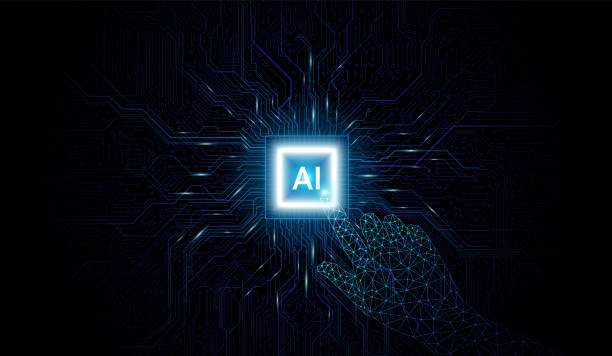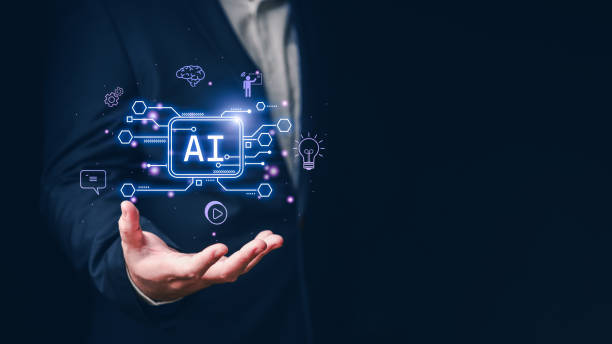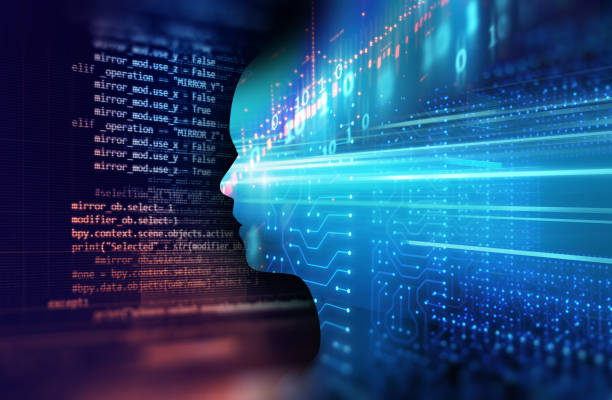What is Artificial Intelligence? Definition, History, and Basic Concepts

In this section, we will define #artificial_intelligence and provide a brief history of the formation of this field.
Artificial intelligence (AI), in short, refers to the ability of a computer system to perform tasks that usually require human intelligence.
These tasks include learning, problem-solving, decision-making, language comprehension, and pattern recognition.
The history of artificial intelligence dates back to the 1950s, when computer scientists began exploring the possibility of building machines that could think.
Since then, artificial intelligence has made remarkable progress and is now present in many aspects of our lives.
To better understand artificial intelligence, we need to be familiar with its basic concepts such as machine learning, neural networks, natural language processing, and computer vision.
Wikipedia provides good information in this regard.
Machine learning is one of the main branches of artificial intelligence that enables machines to learn from data without explicit programming.
Neural networks are computational models inspired by the structure of the human brain that are used to solve complex problems.
Natural Language Processing (NLP) enables machines to understand and process human language, while Computer Vision allows machines to see and interpret images.
Artificial intelligence is currently used in various fields such as medicine, finance, transportation, and manufacturing, and is expected to play a more important role in our lives in the future.
Does your current website reflect your brand’s credibility as it should? Or does it drive away potential customers?
Rasavab, with years of experience in designing professional corporate websites, is your comprehensive solution.
✅ A modern, beautiful website that matches your brand identity
✅ Significant increase in lead generation and new customers
⚡ Contact Rasavab now for a free corporate website design consultation!
Types of Artificial Intelligence: Examining Different Levels of Intelligence

Artificial intelligence can be divided into several categories based on different levels of intelligence.
One of the most common classifications includes Narrow AI, General AI, and Super AI.
Narrow AI, also known as weak AI, is designed to perform specific tasks and performs very well in the same field.
Examples of narrow AI include movie recommendation systems, facial recognition, and machine translation.
These systems can perform their tasks effectively, but cannot operate outside of their area of expertise.
General AI, also known as strong AI, refers to the ability of a machine to understand, learn, and apply intelligence in any field, just like a human.
Currently, general AI does not exist, but many researchers are trying to create this level of intelligence.
Super AI is beyond human intelligence and refers to the ability of a machine to surpass humans in all cognitive aspects.
Creating super AI brings many ethical and security challenges and requires careful consideration.
Understanding these different levels of artificial intelligence helps us to better assess the current and future potentials and limitations of this technology.
See Types of Artificial Intelligence in this link.
Applications of Artificial Intelligence in Various Industries: Opportunities and Challenges

Artificial intelligence is transforming various industries and provides countless opportunities to improve efficiency, reduce costs, and create innovation.
In the field of medicine, artificial intelligence is used for diagnosing diseases, developing drugs, and providing personalized care.
In the financial industry, artificial intelligence is used for fraud detection, risk management, and providing financial consulting services.
In transportation, artificial intelligence plays a role in the development of self-driving cars and route optimization.
In manufacturing, artificial intelligence is used for process automation, quality control, and predicting equipment failure.
These are just a few examples of the wide range of applications of artificial intelligence in various industries.
However, the use of artificial intelligence also brings challenges.
One of the most important challenges is concerns about job losses.
With process automation, many repetitive and routine jobs may be eliminated.
Another challenge is the ethical issues related to the use of artificial intelligence.
Decisions made by artificial intelligence systems must be transparent, fair, and responsible.
Also, maintaining data privacy and preventing the misuse of artificial intelligence is of utmost importance.
To fully benefit from the advantages of artificial intelligence, these challenges must be addressed and appropriate solutions provided.
For more information on the applications of artificial intelligence, see Gartner.
| Industry | Application of Artificial Intelligence |
|---|---|
| Medicine | Disease diagnosis, drug development |
| Finance | Fraud detection, risk management |
| Transportation | Self-driving cars, route optimization |
| Manufacturing | Process automation, quality control |
Machine Learning and Neural Networks: Key Concepts and Algorithms

Machine Learning is one of the main branches of artificial intelligence that allows machines to learn from data without explicit programming.
Machine learning algorithms extract patterns from data and use these patterns for prediction and decision-making.
Neural Networks are computational models inspired by the structure of the human brain that are used to solve complex problems.
A neural network consists of a large number of nodes (neurons) organized in layers and connected to each other.
There are various algorithms for machine learning, including Supervised Learning, Unsupervised Learning, and Reinforcement Learning.
In supervised learning, the machine is trained using labeled data, while in unsupervised learning, the machine tries to find patterns in unlabeled data.
Reinforcement learning is a learning method in which the machine learns how to perform a task in the best way by trial and error.
Neural networks also have different types, including Artificial Neural Networks (ANN), Convolutional Neural Networks (CNN), and Recurrent Neural Networks (RNN).
Each type of neural network is suitable for solving specific problems.
More information is available in the Google Machine Learning Crash Course.
Tired of missing out on business opportunities due to not having a professional corporate website? Don’t worry anymore! With Rasavab’s corporate website design services:
✅ Your brand’s credibility and professionalism will increase.
✅ You will attract more customers and sales leads.
⚡ Get a free consultation now to get started!
Natural Language Processing and Computer Vision: Understanding and Interacting with the Real World

Natural Language Processing (NLP) enables machines to understand and process human language.
This field includes tasks such as machine translation, sentiment analysis, text summarization, and question answering.
Computer Vision allows machines to see and interpret images.
This field includes tasks such as face recognition, object detection, and medical image analysis.
Natural language processing and computer vision enable machines to interact with the real world and collect and process information from various sources.
In natural language processing, various algorithms are used to analyze language structure, understand the meaning of words and sentences, and generate text.
In computer vision, various algorithms are used for pattern recognition, feature extraction, and image classification.
Natural language processing and computer vision are used in various fields such as robotics, self-driving cars, security systems, and virtual assistants.
These two fields are facing significant advances and are expected to play a more important role in our lives in the future.
More information on NLP is available on IBM.
Artificial Intelligence Tools: Introducing and Reviewing Popular Frameworks and Libraries

Various tools and frameworks are used to develop artificial intelligence applications.
Some of the most popular artificial intelligence frameworks and libraries include TensorFlow, PyTorch, scikit-learn, and Keras.
TensorFlow is an open-source framework developed by Google and is used to develop machine learning models and neural networks.
PyTorch is another open-source framework developed by Facebook and is very suitable for deep learning research.
scikit-learn is a Python library that includes various machine learning algorithms and is used for classification, regression, and clustering problems.
Keras is a high-level interface for TensorFlow and PyTorch that makes it easier to develop machine learning models.
In addition to these frameworks and libraries, there are other tools for developing artificial intelligence applications, including data management tools, data visualization tools, and model deployment tools.
The choice of the right tool depends on the type of problem and the project’s needs.
Using the right tools can make the process of developing artificial intelligence applications faster and more efficient.
For more information on artificial intelligence tools, you can visit Built In.
Challenges and Limitations of Artificial Intelligence: Ethical, Security, and Social Issues

The use of artificial intelligence brings several challenges and limitations.
One of the most important challenges is the ethical issues related to automated decision-making.
Artificial intelligence systems may make decisions that are discriminatory or unfair.
Also, the responsibility for decisions made by artificial intelligence systems must be determined.
Another challenge is the security issues related to the misuse of artificial intelligence.
Artificial intelligence systems may be used for malicious purposes such as cyber attacks or generating fake news.
In addition, artificial intelligence can have significant social impacts.
Process automation may lead to job losses and increased economic inequality.
To address these challenges and limitations, appropriate laws and regulations must be established and necessary training provided to individuals.
Also, attention should be paid to ethical issues related to artificial intelligence and efforts should be made to develop artificial intelligence systems fairly, transparently, and responsibly.
For more information on the challenges of artificial intelligence, visit the Future of Life Institute.
| Challenge | Description |
|---|---|
| Ethical Issues | Discriminatory decision-making, responsibility for decisions |
| Security Issues | Cyber attacks, generating fake news |
| Social Impacts | Job losses, increased inequality |
The Future of Artificial Intelligence: Predictions and Emerging Trends

The future of artificial intelligence is very bright and full of potential.
It is predicted that artificial intelligence will play a more important role in our lives in the future and will create significant transformations in various industries.
Some of the emerging trends in the field of artificial intelligence include deep reinforcement learning, explainable artificial intelligence, autonomous artificial intelligence, and ethical artificial intelligence.
Deep reinforcement learning is a combination of reinforcement learning and deep neural networks that is used to solve complex problems.
Explainable artificial intelligence refers to the ability of artificial intelligence systems to provide understandable explanations of their decisions.
Autonomous artificial intelligence refers to artificial intelligence systems that can make decisions and act without human intervention.
Ethical artificial intelligence refers to the development of artificial intelligence systems with consideration of ethical principles and human values.
With technological advances, artificial intelligence systems are expected to become smarter, more efficient, and more reliable.
Also, artificial intelligence is expected to find applications in new fields such as space exploration, sustainable development, and solving global problems.
To prepare for the future of artificial intelligence, we must acquire the necessary skills and take advantage of the new opportunities that this technology offers.
More information is available on McKinsey about this.
Are you tired of losing customers who visit your website to buy?
Rasavab is your specialized solution for having a successful online store.
✅ Significant increase in your online sales
✅ Creating trust and professional branding with customers⚡ Get a free consultation from Rasavab experts!
A Guide to Starting Learning Artificial Intelligence: Educational Resources and Learning Paths

If you are interested in learning artificial intelligence, a variety of educational resources are available to you.
You can use online courses, books, articles, and educational videos to learn the concepts and algorithms of artificial intelligence.
Some of the popular online artificial intelligence courses include courses from Coursera, edX, and Udacity.
Also, there are numerous books on artificial intelligence that can help you learn this field.
For example, the book “Artificial Intelligence: A Modern Approach” by Stuart Russell and Peter Norvig is one of the reference books in this field.
To start learning artificial intelligence, you can start by learning the Python programming language, as Python is one of the most popular programming languages for developing artificial intelligence applications.
Then, you can learn the basic concepts of machine learning and neural networks and do practical projects using artificial intelligence frameworks and libraries.
With practice and repetition, you can strengthen your skills in the field of artificial intelligence and become an artificial intelligence expert.
Artificial Intelligence Training Courses are available in this link.
Artificial Intelligence in Iran: Current Status and Future Prospects

Artificial intelligence is also rapidly developing in Iran, and efforts are being made to use this technology in various industries.
Numerous universities and research centers in Iran are active in the field of artificial intelligence and conduct various research in this field.
Also, startups in Iran are active in the field of artificial intelligence and offer products to solve various problems.
However, the development of artificial intelligence in Iran also faces challenges, including a shortage of specialized workforce, a lack of investment, and a lack of appropriate infrastructure.
Despite these challenges, the outlook for artificial intelligence in Iran is very bright.
Given the talents available in the country and the efforts made, artificial intelligence is expected to play a more important role in Iran’s economic and social development in the future.
To achieve this goal, more investment should be made in education, research, and development of artificial intelligence, and appropriate infrastructure should be provided.
Also, appropriate laws and regulations should be established for the use of artificial intelligence to prevent the misuse of this technology.
For more information on artificial intelligence in Iran, you can visit the Iranian Natural Language Processing Association.
Frequently Asked Questions
| Question | Answer |
|---|---|
| What is artificial intelligence? | It is the simulation of human intelligence in machines that are programmed to think like humans and imitate their actions. |
| What are the main branches of artificial intelligence? | They include machine learning, deep learning, natural language processing, computer vision, and robotics. |
| What is Machine Learning? | It is a branch of artificial intelligence that focuses on enabling systems to learn from data and identify patterns without explicit programming. |
| Mention examples of artificial intelligence applications in our daily lives. | Voice assistants (such as Siri and Alexa), recommendation systems on Netflix and Amazon, self-driving cars, and facial recognition programs. |
| What is Deep Learning? | It is a subset of machine learning that uses multi-layered (deep) artificial neural networks to process large amounts of data. |
| What is Natural Language Processing (NLP)? | It is a branch of artificial intelligence that focuses on enabling computers to understand, interpret, and generate human language. |
| What are some of the ethical concerns related to artificial intelligence? | They include bias in data, privacy, job losses, and liability in case of errors. |
| What are the main benefits of artificial intelligence? | Increased efficiency, improved decision-making, automation of repetitive tasks, and discovery of complex patterns in data. |
| How is artificial intelligence used in healthcare? | In diagnosing diseases, discovering drugs, analyzing medical images, and providing personalized care for patients. |
| How do you see the future of artificial intelligence? | It is expected to continue to evolve at a rapid pace, affecting all aspects of human life, from industry to education and entertainment. |
And other services of Rasa Web Advertising Agency in the field of advertising
Smart Marketing Automation: A creative platform for improving sales growth with marketing automation.
Smart Marketing Automation: A creative platform for improving campaign management with marketing automation.
Smart SEO: A fast and efficient solution for digital branding with a focus on dedicated programming.
Smart Marketing Automation: Professional optimization to increase sales using user experience customization.
Smart Customer Journey Map: Professional optimization for customer acquisition using key page optimization.
And more than hundreds of other services in the field of Internet advertising, advertising consulting, and organizational solutions
Internet Advertising | Advertising Strategy | Advertisement Report
Sources
What is Artificial Intelligence?
,Artificial Intelligence and Cyberspace are two important cancers of Iran’s cyber security space
,Artificial Intelligence Predictions in 2024
,Artificial intelligence from A to Y/ from the starting point, what is artificial intelligence and how does it work
? For your business to leap in the digital space, Rasa Web Digital Marketing Agency, with expertise in SEO, targeted content marketing, and user-friendly website design, is your guide to success.
📍 Tehran, Mirdamad Street, next to the Central Bank, South Kazerun Alley, Ramin Alley, No. 6
“`




